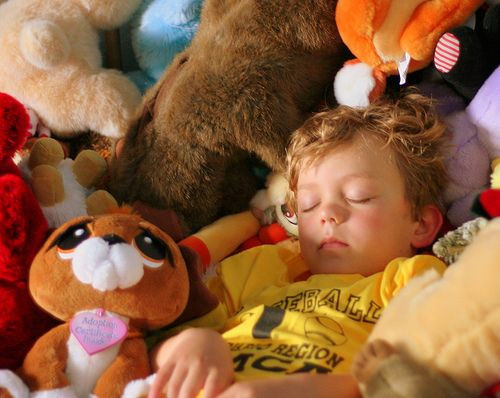Preschool Naps Enhance Learning And Memory In Children: What Happens To A Young Brain During Naptime?

Preschool! It can be a carefree time in a child’s life, where anxiously waiting for recess and trying to remember the alphabet are the biggest worries of the day.
However, the greatest feature of preschool is undoubtedly naptime, and new research shows that this midday sleep session can give children a mental advantage and potentially improve academic performance.
"Until now, there was nothing to support teachers who feel that naps can really help young children. There had been no concrete science behind that," said child psychologist Rebecca Spencer of the University of Massachusetts Amherst (UMass).
Sleep Is When We Grow… Our Brains?
Some have questioned whether or not naptime is truly valuable. When babies are born, their sleep patterns are polyphasic — meaning they sleep at random points during the day — but this transforms into biphasic sleep — twice a day — by the age of 3-4. By the age of 5, most kids have matured into the adult pattern of sleeping only at night. During this time, the brain is rapidly developing, building memories, and learning facts.
Scientists have wondered if biphasic sleep is essential for this learning process or if switching to one sleep session per day is critical for making the leap to mental maturity.
To answer this question, Dr. Spencer and her colleagues recruited 40 children across six schools in western Massachusetts to play a visual-spatial challenge, similar to the game Memory. During the morning portion of one school day, the kids were presented with a grid of pictures and had to remember where different images were located. Afterwards, they continued with their regular routine until afternoon naptime, when half of the classrooms slept, while the rest stayed awake.
Before naptime, all of the kids demonstrated the same amount of memory recall, but this changed significantly after a bout of rest. After naptime, kids who slept had higher scores — 75 percent accuracy — compared to children who remained awake — 65 percent accuracy. This 10 percent advantage remained intact the next day, even after the kids had a full night of rest.
"While the children performed about the same immediately after learning in both the nap and wake conditions, the children performed significantly better when they napped both in the afternoon and the next day," the authors summarized. "That means that when they miss a nap, the child cannot recover this benefit of sleep with their overnight sleep. It seems that there is an additional benefit of having the sleep occur in close proximity to the learning."
To explore the internal basis of this change, the researchers invited an additional subset of preschoolers to sleep at UMass in order to measure their brain activity while they napped. The team recorded a correlation between the level of the memory boost and “sleep spindle density," which is activity associated with integrating new information in the mind.
This groundbreaking study comes at a time when educators and policymakers across the country are pushing to make preschool more universal. Getting a jump on education can, as one might expect, translate into long-term academic achievement. However, some economists believe preschool could save the world, given a broad range of socioeconimic benefits — including less imprisonment and higher incomes — have been observed in some studies for those who attended preschool.
Yet, a national standard for preschool education has not been established, and the results suggest that any future plans should incorporate a nap period into the preschool day.
“We hope these results will be by policy makers and center directors to make educated decisions regarding the nap opportunities in the classrooms,” concluded Spencer. “Children should not only be given the opportunity, they should be encouraged to sleep by creating an environment which supports sleep."
Source: Kurdziel L, Duclos K, Spencer RMC. Sleep spindles in midday naps enhance learning in preschool children. PNAS. 2013.



























